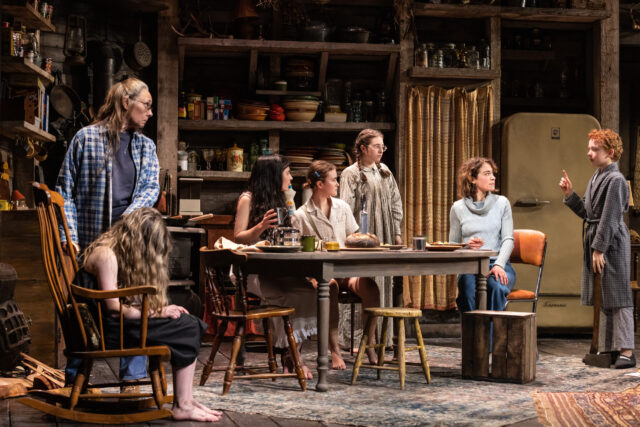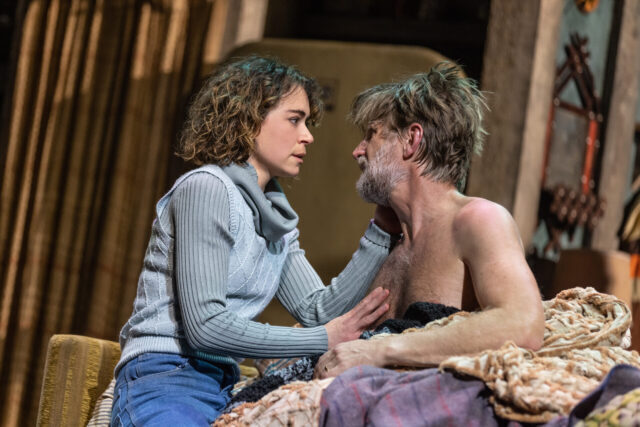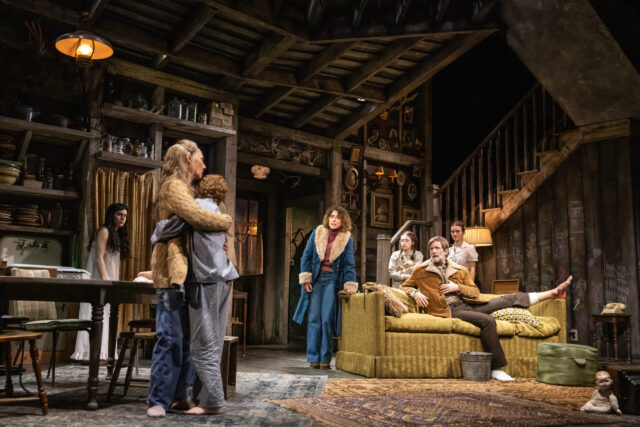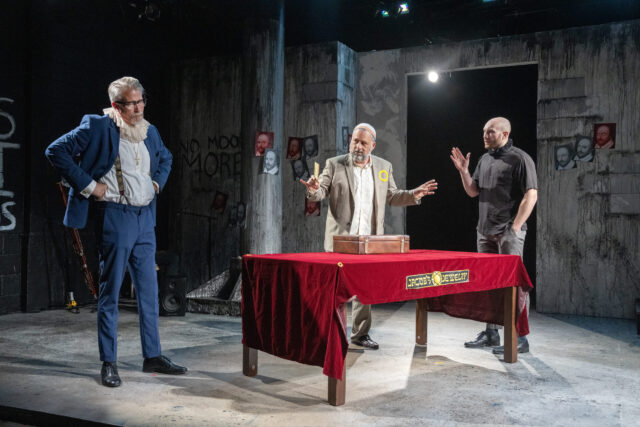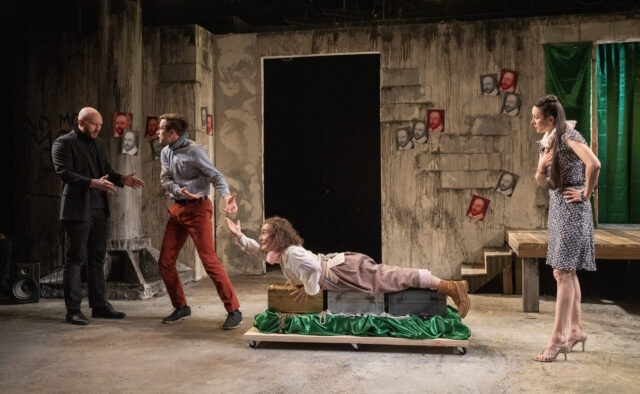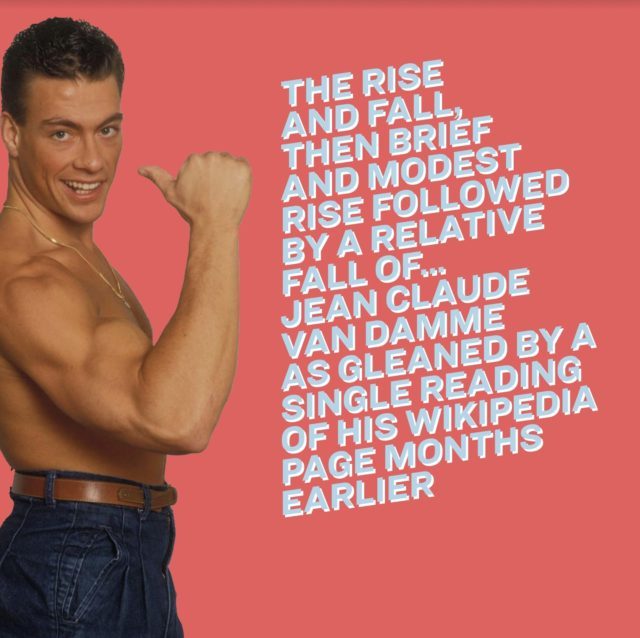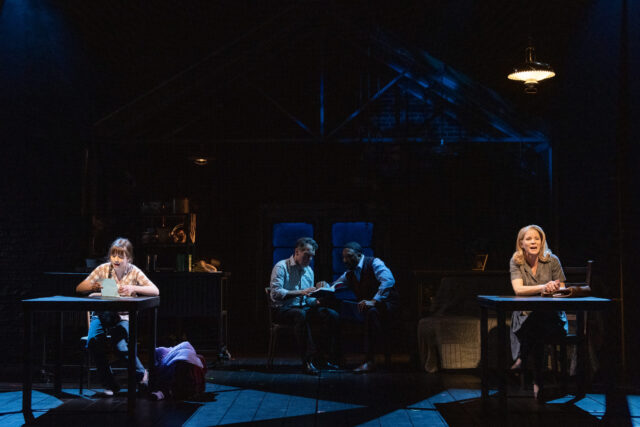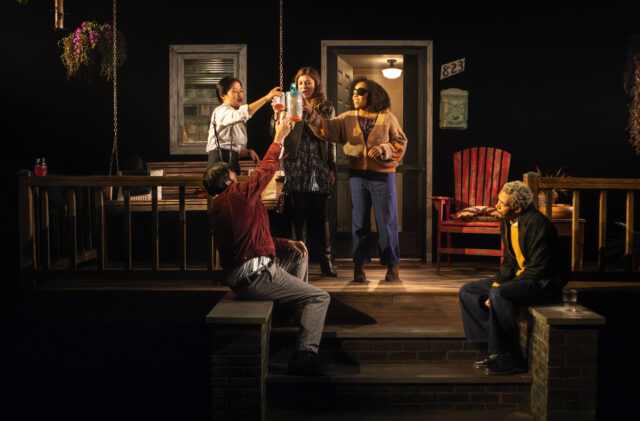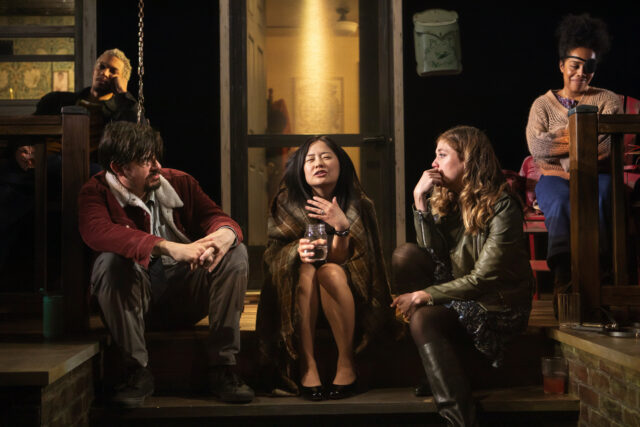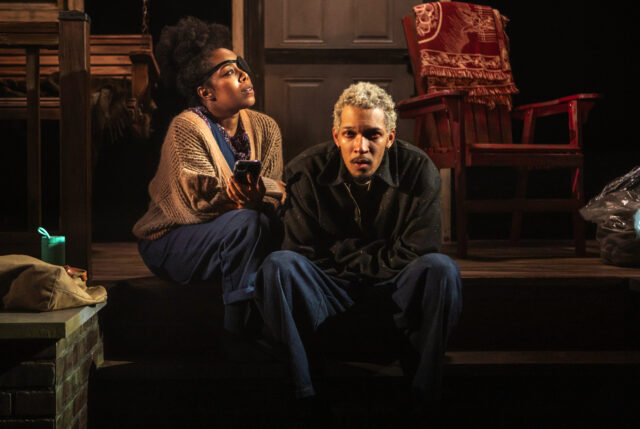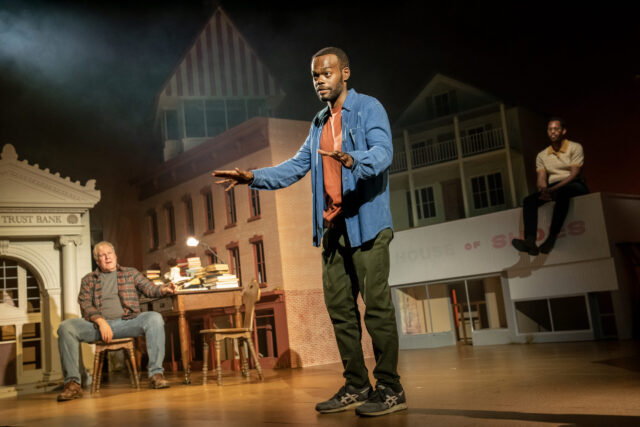
Kenneth (William Jackson Harper) has difficulty facing reality in Eboni Booth’s Primary Trust (photo by Joan Marcus)
PRIMARY TRUST
Roundabout at Laura Pels Theatre
Harold and Miriam Steinberg Center for Theatre
111 West 46th St. between Sixth & Seventh Aves.
Tuesday – Sunday through July 2, $56-$147
212-719-1300
www.roundabouttheatre.org
Eboni Booth’s sensational Primary Trust is an Our Town — or, more accurately, a My Town — for this very moment in time, in the twenty-first century. It beautifully captures the feelings of longing and loneliness so many of us experience in this digital age, especially coming out of a global pandemic permeated by isolation. Instantly a Best Play of the Year favorite, the ninety-five-minute show is anchored by a gorgeous performance by William Jackson Harper as Kenneth, our thirty-eight-year-old unreliable narrator and protagonist.
Primary Trust unfolds in the fictional community of Cranberry, New York, forty miles east of Rochester. Marsha Ginsberg’s lovely set is a miniature version of the town, with a bank, a tiki bar, a vacant shoe store, and a church; it is essentially Anywhere, USA. As the audience enters the theater, Chicago-born singer-songwriter and actor Luke Wygodny, is onstage, playing guitar. He later moves to keyboards off stage left, where he serves as the piano player at Wally’s and adds incidental music throughout.
The play begins with Kenneth addressing the audience. “This is what happened,” he says tentatively but with immense charm. “This is the story of how if you had asked me six months ago if I was lonely, I would have said . . . This is the story of a friendship. Of how I got a new job. A story of love and balance and time. And the smallest of chances.”
It’s clear from the start that Kenneth has social issues and is not well educated. He is haunted by the death of his mother, who died when he was only ten years old; he was raised in an orphanage and several foster homes. But instead of being angry or looking for excuses for his relative lack of success — he doesn’t see himself as a failure, seemingly enjoying his simple life — he is a gentle soul with a tender view of the world, or at least Cranberry, which is his entire world.
He’s been working as a clerk at a bookshop on Main St. for twenty years; his boss, Sam (Jay O. Sanders), treats him well. Every night, Kenneth goes to Wally’s, a tiki hut where he drinks mai tai after mai tai until the bar closes. He orders for two; he is always there with Bert (Eric Berryman), a married man with two daughters. Kenneth is not religious, but he explains, “I don’t really believe in God or heaven or hell, but I do believe in friends, and Bert is the best friend around.” They do just about everything together, but there’s one problem.
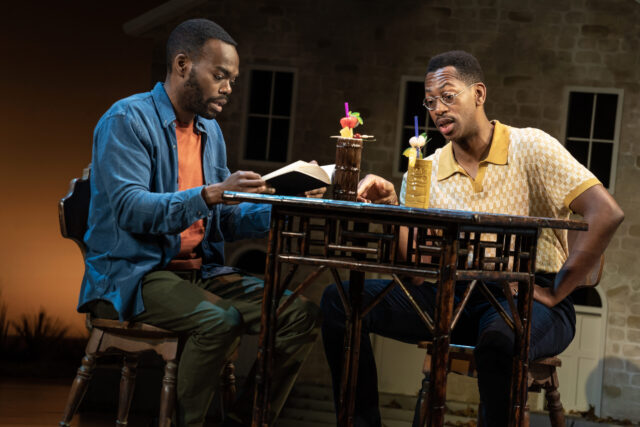
Kenneth (William Jackson Harper) spends most of his nights in a tiki bar with his best friend, Bert (Eric Berryman) (photo by Joan Marcus)
Bert is imaginary, and Kenneth knows it.
“He exists only in my head,” Kenneth reveals. “But that doesn’t make him any less real. He has arms and legs. A face, a heart — a good heart.”
Kenneth is generally an easygoing guy, but he becomes distressed when Sam tells him that he and his wife have sold the bookstore and are moving to Arizona. Desperate to find a job, he learns from Corinna (April Matthis), a waitress at Wally’s, that there’s an open position at the Primary Trust bank; Kenneth is interested because his mother used to work at Mutual Loan. Kenneth has trouble making important decisions without Bert, so he brings him along on the interview with Clay (Sanders), a good-natured bear of a man who takes a shine to Kenneth, as we all do, wanting him to succeed. “I have a brother,” Clay tells him. “Got into a car accident in high school, hit his head pretty bad. You remind me of him.”
Kenneth gets the job, but when he has one awful day, he’s not sure he’ll ever get over it as the careful life he’s created in his head is suddenly thrown off-kilter.
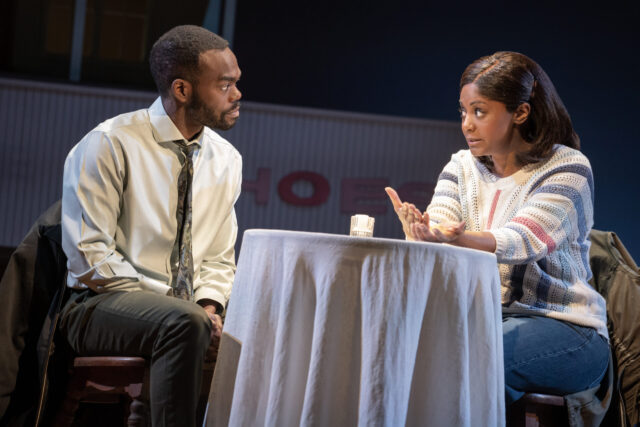
Kenneth’s (William Jackson Harper) life takes a new turn when he meets Corinna (April Matthis) (photo by Joan Marcus)
The Bronx-born Booth, who worked in bars and restaurants and has spoken about having a drinking problem, appeared in the terrific Dance Nation and Fulfillment Center, and her previous play, Paris, was set in a superstore in the fictional Paris, Vermont; she writes in a clear, familiar style that sucks you right in, offering a sweet affection for small-town living. In Primary Trust, she takes great care in every detail; even the names of the banks offer insight into Kenneth’s situation: His mother worked at Mutual Loan, evoking his need to be with her and not be alone, while he gets a job at Primary Trust, where he has to build confidence that he can handle life on his own and trust others.
Director Knud Adams, who helmed Paris and such other ensemble pieces as Sanaz Toossi’s Pulitzer Prize–winning English and Gracie Gardner’s hard-hitting I’m Revolting, guides the narrative with a touching and warmhearted hand that will have even the most cynical city dwellers feel sentimental about small town life, at least for an hour and a half. Qween Jean’s costumes, Isabella Byrd’s lighting, and Mikaal Sulaiman’s sound further immerse you into the bittersweet ups and downs of Cranberry.
Berryman (Toni Stone, The B-Side: Negro Folklore from Texas State Prisons) plays the kind of imaginary friend anyone would be lucky to have, even as we learn about where he came from. The always stalwart Sanders (Uncle Vanya, King Lear) is superb as Sam and Clay, two understanding father figures to Kenneth, as well as a funny garçon. Matthis (Help, Toni Stone) is a whirlwind playing multiple Wally’s waitresses and bank customers. Wygodny gets bonus time by occasionally interacting with Kenneth.
Harper (After the Blast, All the Way) is unforgettable as Kenneth, instilling in him a childlike sense of wonder and innocence; in many ways Kenneth is still that ten-year-old boy even as he realizes that he needs to start becoming an adult and accept his own responsibilities. Harper was nominated for an Emmy for his role on The Good Place portraying Chidi Anagonye, a moral philosopher and bundle of neuroses unable to make a decision; Kenneth feels like a natural progression for him. Kenneth is such a nice, well-meaning guy that you’ll want to be by his side, go with him to Wally’s and gulp a few mai tais, then comfort him when his loneliness overtakes him. You don’t have to have lost a parent, a job, or a best friend in order to relate to the isolation that envelops him. You just have to have empathy and compassion for other human beings, as well as yourself. There’s a reason why this town’s motto is “Welcome, Friend, You’re Right on Time!”
